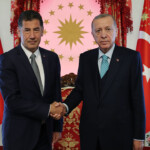Alexander Clarkson is a lecturer in German and European Studies in King’s College London. He sat down with FTP to discuss the future of Turkey-Eu relations.
In a broader, historical perspective, how do you define the election results?
In the build up to the elections many on the EU side, particularly in Germany, Romania, Italy, even Greece, had developed hopes based on polling and based on their contacts within the Turkish system as well as opposition that the Erdoğan era was coming to an end.
This fostered a wider debate within EU institutions in Brussels about how to reconfigure possible integration or alignment pathways (slightly different concepts in EU terms) for a post-Erdogan government that could open up access for trade via an updated Customs Union as well as greater access to the EU single market for Turkish citizens through agreements in which the EU as well as Turkey stuck to agreed conditions over visa free travel, border coordination, regulatory alignment and so on.
The aim was to find means of developing closer relations parallel to accession talks rather than through them, since even with the CHP in power the consensus is the membership perspective would still remain more or less frozen.
With Erdoğan’s victory and the particular party political configuration of the next parliament in which ultra-nationalist parties seem to be on the march even as the AKP base erodes a bit, any of these hopes for closer cooperation and engagement with Turkey as part of a wider EU European framework involving states around the EU Neighbourhood have been shelved.
So in terms of the historical perspective of EU-Turkey relations, the election results mark a moment of collective European shrugging of shoulders, i.e. even the more Turkey-friendly parts of the EU system that for decades have worked for and hoped for a close relationship are now giving up on it, possibly for a decade or two, and have joined the Turkey-sceptic parts of the EU system in resigning themselves to a transactional relationship.
With Turkey’s economic troubles building, this election marks the final point for quite some time into the future at which the EU as a whole now sees Turkey as a problem to be managed rather than a partner with which to build closer relations.
Even if Erdoğan’s system eventually craters and through some political miracle more liberal and progressive forces in Turkey gain rather than the ultra-nationalist Turkes-tradition parties that are more likely to take over after the AKP, any Turkish government will face entrenched suspicion from Brussels that the effort in opening up the Single Market for Turks and Turkish businesses might prove futile all over again in the face of continuing instabilities in the Turkish system.
You have also kept a close look at the voting patterns of the diaspora. What do you read into it?
I think people focus too much on the pro-Erdoğan results of around 65 % in Germany and other states that took in the guest worker waves, rather than looking at voter eligibility and participation rates.
Yes, it is a problem for the German system, especially if around 500 thousand Turkish-Germans are willing to vote for AKP or MHP. That is a huge integration issue.
But it misses that this is 500 thousand of 1.5 million eligible diaspora voters out of a community of 3 million. And only 700 thousand Turkish-Germans voted in the elections.
There is a severe problem here, and paradoxically it’s also an indication of how hard Far Right views that, if the CDU/CSU does not engage with the community might fall to the advantage of the Far Right German AfD, if and when these culturally conservative parts of the Turkish-German community integrate.
But these numbers should not distract from how much of the Turkish-German community is either not supportive of the AKP/MHP, or more saliently, is largely disengaged and uninvolved in diaspora politics. After all, by this point the great grandchildren of the first guest worker generation are beginning to hit voting age, so this whole integration process is still playing out gradually.
A new cabinet is announced and has started to operate. What is your assessment of its composition, in terms of the personalities appointed? What signals does Erdoğan intend to send to the West with this cabinet?
With the composition of the cabinet, again I’ll take the situation from the perspective of EU institutions in Brussels and EU member states. The Commission, the ECB as well as those EU member state governments that are most focused on Turkey have all seen this before. They know who Şimşek is, and are familiar with actors like Fidan and Kalın, who have been moved around.
In NATO, Akar was at least considered to be a known quantity, so that retirement might generate a little more concern there (though of all of them, I think Akar was the cleverest in leaving the scene quietly and with no fuss, at least he gets a quiet coda to his career).
The EU’s familiarity with figures like Şimşek in particular is a double-edged sword for Ankara, and the AKP/MHP party/state coalition that keeps Erdoğan on top.
On the one hand for EU institutions, a figure like Şimşek is considered sane and sensible, someone the Commission and ECB can do business with (I think Erkan will be secondary even in cooperation with the ECB) and who everyone knows has views and skills anchored in the economic realities the EU and Turkey face.
On the other hand, everyone in Brussels and MS capitals knows that in the end Erdoğan calls the shots, and can remember what happened to Şimşek and his policies last time around.
So the EU Europeans are going to sit back and watch things unfold over time, to see how much power people like Şimşek have. The problem is with the crashing Lira and financial services sector in crisis, Turkey may not have that time, and ends up needing help from sceptical partners in EU institutions who are too slow to give it.
It is exposing a dilemma…
Yes, and that leads to the EU’s dilemma with Turkey after this election. Hope that Turkey could produce a new government the EU can trust is now gone.
And gone probably at least for a decade and probably more.
Yet Turkey’s economy is fundamentally intertwined through trade, financial services, supply chains and migration with the EU’s Single Market in a way that, for all the AKP’s rhetoric, Turkey never will be with the Middle East or any other global region.
So Turkey is also a too big to fail problem for the EU, since economic and political collapse in Turkey has immediate shock effects for the EU’s political and economic system. How Brussels navigates through these dilemmas is a big question, I don’t think anyone in EU institutions or member states really has an answer to.
Finally, regarding TR’s foreign policy, which seems linked more than ever before to its fading economic outlook. Do we expect any changes at all, re: TR-US or TR-NATO or TR-EU relations? And what about conflict spots such as Syria, Greece, East Med and Caucasus?
On all these issues you mention, the EU and its member states including Greece and Cyprus are not so much going to be transactional as go into a wait and see holding pattern.
There is a sense that we are now in the late stage Erdoğan era with a lot unclear about what will follow. Indications are now strong that ultra-nationalists are more likely to replace or co-opt Erdogan’s power structures after he keels over rather than more liberal and progressive forces.
Turkey’s economy and state institutions are in a mess. That means the EU will work with Ankara in the next few years when necessary, but remain very cautious and avoid any grand bargains with a regime it does not trust and whose future looks unclear.


